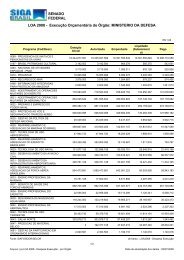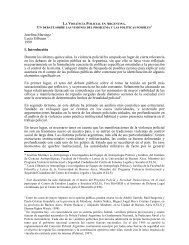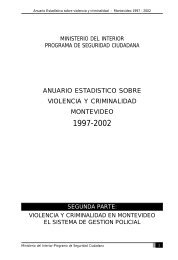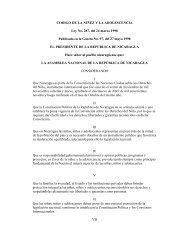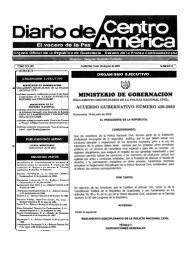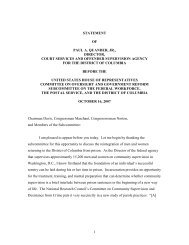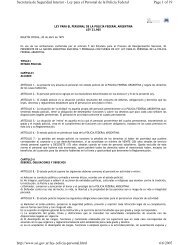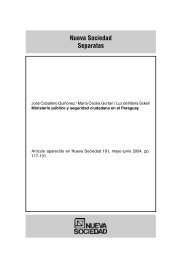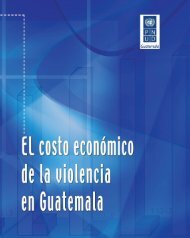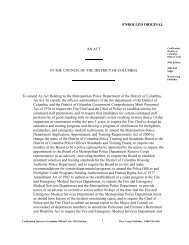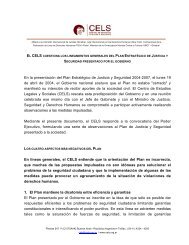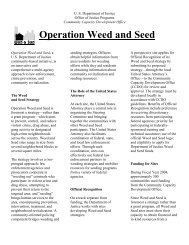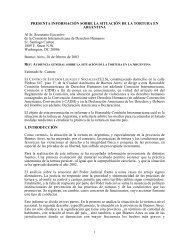Venezuela: The Life and Times of the Party System - Political ...
Venezuela: The Life and Times of the Party System - Political ...
Venezuela: The Life and Times of the Party System - Political ...
You also want an ePaper? Increase the reach of your titles
YUMPU automatically turns print PDFs into web optimized ePapers that Google loves.
<strong>and</strong> now sought accommodation with AD. Within AD itself, leaders now saw that <strong>the</strong><br />
overwhelming majorities <strong>of</strong> <strong>the</strong> 1940s had created false confidence, making <strong>the</strong> party ignore <strong>the</strong><br />
need to bring o<strong>the</strong>rs along.<br />
Elite underst<strong>and</strong>ings <strong>of</strong> <strong>the</strong> trienio were shaped <strong>and</strong> amplified by <strong>the</strong> specific character <strong>of</strong><br />
<strong>the</strong> transition to democracy in 1958. From <strong>the</strong> very beginning <strong>the</strong> transition was an enterprise<br />
built on coalitions. <strong>Political</strong> parties cooperated, both underground <strong>and</strong> through pacts forged<br />
among exile leaders. Business <strong>and</strong> pr<strong>of</strong>essional groups joined, as did key elements in <strong>the</strong><br />
military <strong>and</strong> popular organizations linked to <strong>the</strong> political parties. Bear in mind that although <strong>the</strong><br />
dictator was thrown out, <strong>the</strong> military institution remained intact. Great effort was expended in<br />
1958 <strong>and</strong> after to woo <strong>the</strong> <strong>of</strong>ficer corps, purging disloyal elements while gradually bringing new<br />
generations along. <strong>The</strong> need to hold such diverse allies toge<strong>the</strong>r reinforced dispositions to<br />
prudent compromise. <strong>The</strong>re was broad commitment to free open <strong>and</strong> elections, a commitment<br />
maintained throughout <strong>the</strong> year in which <strong>the</strong> Provisional Government held power. Fur<strong>the</strong>r, <strong>the</strong><br />
1958 elections also demonstrated that AD’s overwhelming majorities were a thing <strong>of</strong> <strong>the</strong> past.<br />
Compromise was not thus only desirable, it was also essential to effective rule.<br />
This sort <strong>of</strong> strategy was by no means inevitable. Many on <strong>the</strong> Left, for example, hoped<br />
to push for thorough social <strong>and</strong> economic change, relying more on mass mobilization than<br />
interelite compromise <strong>and</strong> accommodation. But in 1958 <strong>and</strong> after, key <strong>Venezuela</strong>n leaders<br />
correctly believed that without revolution <strong>and</strong> firm control <strong>of</strong> armed force, strategies <strong>of</strong> that kind<br />
were doomed. <strong>The</strong>y also knew that even under <strong>the</strong> best <strong>of</strong> circumstances, democracy is not a<br />
likely result <strong>of</strong> <strong>the</strong>se strategies. Power is ei<strong>the</strong>r too concentrated in <strong>the</strong> party running <strong>the</strong> show<br />
(which thus becomes ano<strong>the</strong>r dictatorship) or conflict is so exacerbated as to make survival<br />
simply impossible. Having failed with similar approaches in <strong>the</strong> past, (i.e., dominance in <strong>the</strong><br />
trienio), <strong>the</strong> political class learned from experience <strong>and</strong> opted this time for caution, conciliation,<br />
compromise <strong>and</strong> prudence.<br />
Prior to <strong>the</strong> 1958 elections, <strong>the</strong> major non-Communist parties (AD, COPEI, <strong>and</strong> URD)<br />
signed two formal agreements. <strong>The</strong> first, known as <strong>the</strong> Pact <strong>of</strong> Punto Fijo, pledged <strong>the</strong><br />
signatories to respect elections whatever <strong>the</strong> outcome, to maintain a political truce<br />
depersonalizing debate <strong>and</strong> ensuring interparty consultation on touchy matters, <strong>and</strong> to share<br />
political responsibility <strong>and</strong> patronage. <strong>The</strong> stress on pacts <strong>and</strong> interparty cooperation was<br />
embodied in a series <strong>of</strong> coalition governments led by AD. Formal coalition rule lasted for ten<br />
years, with AD’s partners changing but <strong>the</strong> general orientation to coalition remaining constant.<br />
When explicit coalition rule ended after 1968, a series <strong>of</strong> agreements known as <strong>the</strong> Pacto<br />
Institucional ensured that <strong>the</strong> spirit <strong>of</strong> political cannibalism would not return. <strong>The</strong> use <strong>of</strong> coalitions<br />
extended beyond national politics to all levels <strong>of</strong> organized activity: trade unions <strong>and</strong> secondary<br />
associations generally began choosing leaders by proportional representation, with leadership



